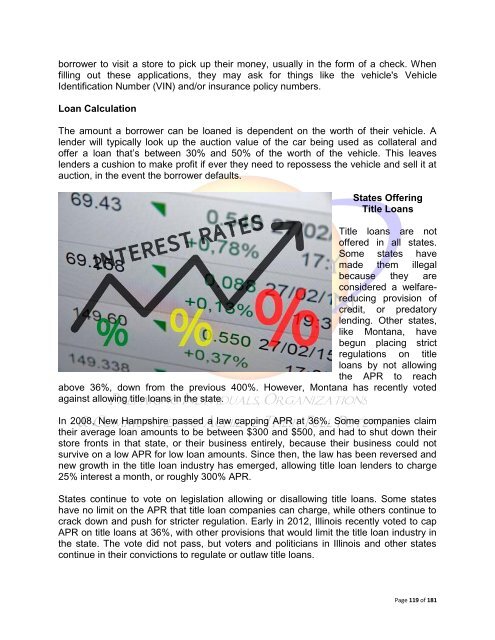You also want an ePaper? Increase the reach of your titles
YUMPU automatically turns print PDFs into web optimized ePapers that Google loves.
orrower to visit a store to pick up their money, usually in the form of a check. When<br />
filling out these applications, they may ask for things like the vehicle's Vehicle<br />
Identification Number (VIN) and/or insurance policy numbers.<br />
Loan Calculation<br />
The amount a borrower can be loaned is dependent on the worth of their vehicle. A<br />
lender will typically look up the auction value of the car being used as collateral and<br />
offer a loan that’s between 30% and 50% of the worth of the vehicle. This leaves<br />
lenders a cushion to make profit if ever they need to repossess the vehicle and sell it at<br />
auction, in the event the borrower defaults.<br />
States Offering<br />
Title Loans<br />
Title loans are not<br />
offered in all states.<br />
Some states have<br />
made them illegal<br />
because they are<br />
considered a welfarereducing<br />
provision of<br />
credit, or predatory<br />
lending. Other states,<br />
like Montana, have<br />
begun placing strict<br />
regulations on title<br />
loans by not allowing<br />
the APR to reach<br />
above 36%, down from the previous 400%. However, Montana has recently voted<br />
against allowing title loans in the state.<br />
In 2008, New Hampshire passed a law capping APR at 36%. Some companies claim<br />
their average loan amounts to be between $300 and $500, and had to shut down their<br />
store fronts in that state, or their business entirely, because their business could not<br />
survive on a low APR for low loan amounts. Since then, the law has been reversed and<br />
new growth in the title loan industry has emerged, allowing title loan lenders to charge<br />
25% interest a month, or roughly 300% APR.<br />
States continue to vote on legislation allowing or disallowing title loans. Some states<br />
have no limit on the APR that title loan companies can charge, while others continue to<br />
crack down and push for stricter regulation. Early in 2012, Illinois recently voted to cap<br />
APR on title loans at 36%, with other provisions that would limit the title loan industry in<br />
the state. The vote did not pass, but voters and politicians in Illinois and other states<br />
continue in their convictions to regulate or outlaw title loans.<br />
Page 119 of 181

















